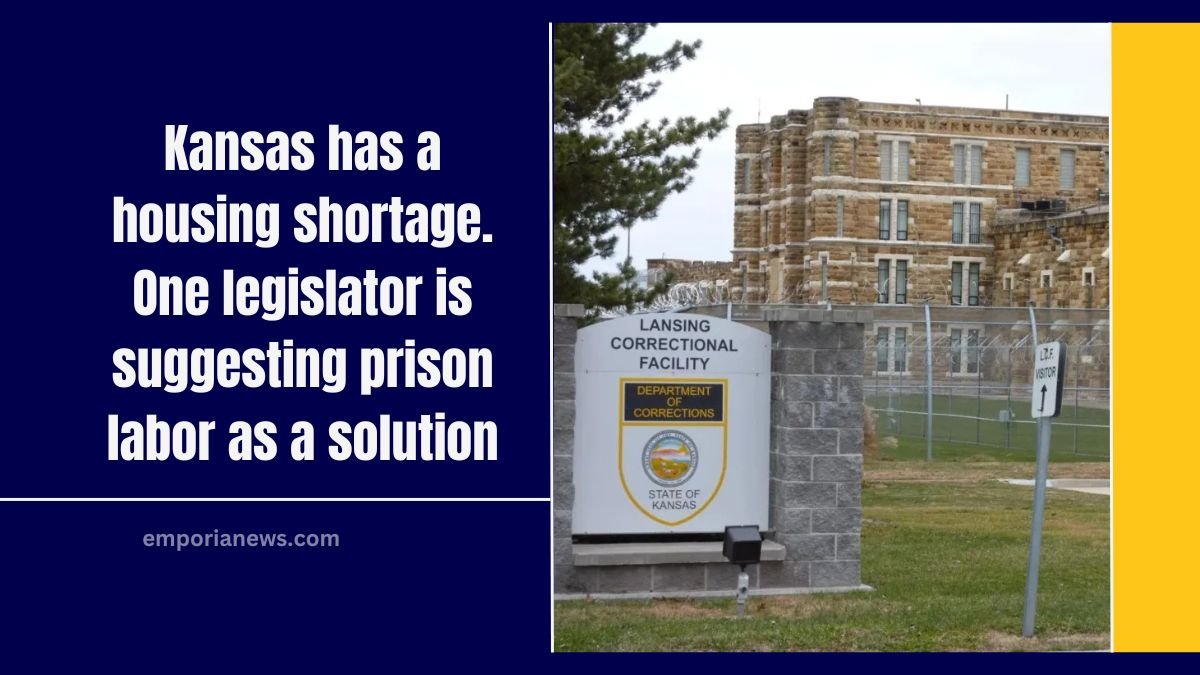A significant housing shortage in Kansas has prompted an unconventional proposal that aims to address both a growing need for affordable housing and the rehabilitation of incarcerated individuals.
A new legislative initiative suggests that prison labor be harnessed to construct housing units in areas experiencing minimal development activity.
This proposal, emerging from Topeka, seeks to create an exception within current state laws that restrict the use of inmate labor for construction projects.
Housing Crisis in Kansas
Kansas faces a pronounced shortage of housing in both rural and urban regions. Recent analyses indicate that rural areas may require thousands of new housing units over the next few years.
Metropolitan regions, while not included in these estimates, also face their unique challenges in meeting housing demands.
The persistent shortage has spurred legislators to consider creative solutions that extend beyond traditional building practices.
Legislator Rep. Kyler Sweely has brought forward a bill that would authorize the use of prison labor in constructing housing units.
The proposal focuses on areas with “minimal building activity,” where the need for affordable housing is most acute.
The bill outlines a plan where the state’s corrections department, which manages eight prisons, would be allowed to develop training programs. These programs would equip inmates with construction skills while producing housing units for communities in need.
Legislative Proposal Details
The new bill proposes an exception to existing Kansas laws that currently prevent the corrections department from using inmate labor to manufacture or construct houses.
Under the revised framework, the department could partner with local communities to identify eligible areas that have not seen significant development despite efforts to promote growth.
Key elements of the proposal include:
- Creation of Training Programs: Inmates would receive hands-on training in construction trades, such as masonry, carpentry, and general building techniques.
- Targeted Housing Development: The program would focus on rural and underdeveloped urban areas where housing is scarce.
- Partnership with Local Communities: Local governments and community organizations would collaborate with the state to determine priority areas for housing development.
- Economic and Social Benefits: The initiative aims to address housing shortages while offering inmates valuable job skills, potentially aiding their reintegration into society upon release.
Advantages and Concerns
The proposal has sparked a debate among stakeholders in Kansas. Proponents argue that this initiative could provide a dual benefit: alleviating the state’s housing crisis and offering a path toward rehabilitation for inmates.
By learning trade skills and contributing to community development, incarcerated individuals could gain a foothold for future employment and societal reintegration.
The construction industry, including groups like the Associated General Contractors of Kansas, has expressed support for the proposal.
They contend that such a program would not only expand the state’s workforce but also create opportunities for individuals looking to restart their lives. The industry’s involvement could help ensure that the program adheres to high standards of quality and efficiency.
However, concerns have been raised by organizations advocating for prisoner rights. Critics emphasize the risk of exploitation if the program is not carefully regulated.
Ensuring that participation is truly voluntary, that inmates receive fair compensation, and that labor conditions meet established standards is of paramount importance.
Critics also highlight that, historically, prison labor in Kansas has been associated with extremely low wages, sometimes less than a dollar per day for certain jobs. There is an ongoing debate about how to balance the benefits of job training with the risk of economic injustice.
Perspectives from Various Stakeholders
The proposal has elicited mixed reactions:
- Support from the Construction Sector:
- Industry leaders see the initiative as a way to bolster the workforce.
- There is optimism about the potential for improved job training programs within correctional facilities.
- Concerns from Civil Liberties Groups:
- Advocates urge strict safeguards to prevent exploitation.
- Emphasis is placed on ensuring fair wages and voluntary participation for inmates.
- Legislative Considerations:
- The bill has not yet been scheduled for a hearing, which may affect its progress during the current legislative session.
- Lawmakers are weighing the potential benefits against the inherent risks associated with modifying existing labor practices.
| Aspect | Details |
|---|---|
| Issue | Housing shortage across rural and urban areas in Kansas |
| Legislative Proposal | Bill proposed to allow prison labor for constructing housing units in areas with minimal building activity |
| Proponent | Rep. Kyler Sweely (Republican, representing Hutchinson) |
| Current Law | Prevents the corrections department from using inmate labor to manufacture or build houses |
| Proposed Changes | Exception allowing corrections department to establish construction training programs for inmates, partnering with local communities |
| Goals | Address housing shortage; provide inmates with job training and reintegration opportunities |
| Supporters | Kansas construction industry, including the Associated General Contractors of Kansas |
| Concerns | Potential exploitation of inmates; ensuring voluntary participation, fair compensation, and adherence to labor standards |
| Economic Impact | Could grow the Kansas workforce and supply affordable housing in areas with critical needs |
| Next Steps | Bill pending a hearing; further legislative review required |
Quick Reference Bullet Points
- Housing Crisis: Kansas requires thousands of new housing units, particularly in rural regions.
- Legislative Initiative: The bill proposes using prison labor to build housing in areas with minimal development.
- Job Training: Inmates would gain construction skills that may aid their post-incarceration reintegration.
- Industry Support: The construction sector supports the initiative, seeing it as an opportunity to expand the workforce.
- Civil Liberties Concerns: Advocacy groups caution against potential exploitation without strict safeguards.
- Bill Status: The proposal awaits a legislative hearing, which may influence its advancement in the current session.
The innovative proposal to utilize prison labor for housing development in Kansas represents a bold attempt to solve a multifaceted problem.
With a focus on both addressing a severe housing shortage and offering inmates critical job training, the initiative promises economic and social benefits.
However, careful consideration and robust safeguards will be essential to prevent exploitation and ensure that the program benefits all stakeholders.
As discussions continue, Kansas stands at a crossroads, exploring whether this unconventional approach can become a sustainable model for addressing housing and workforce challenges.




